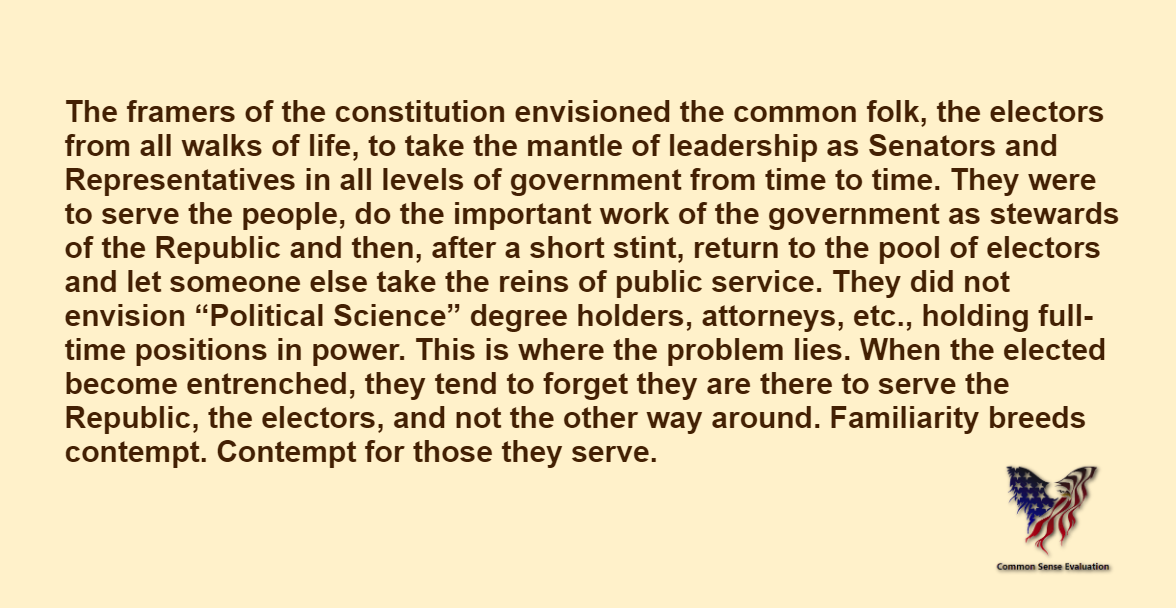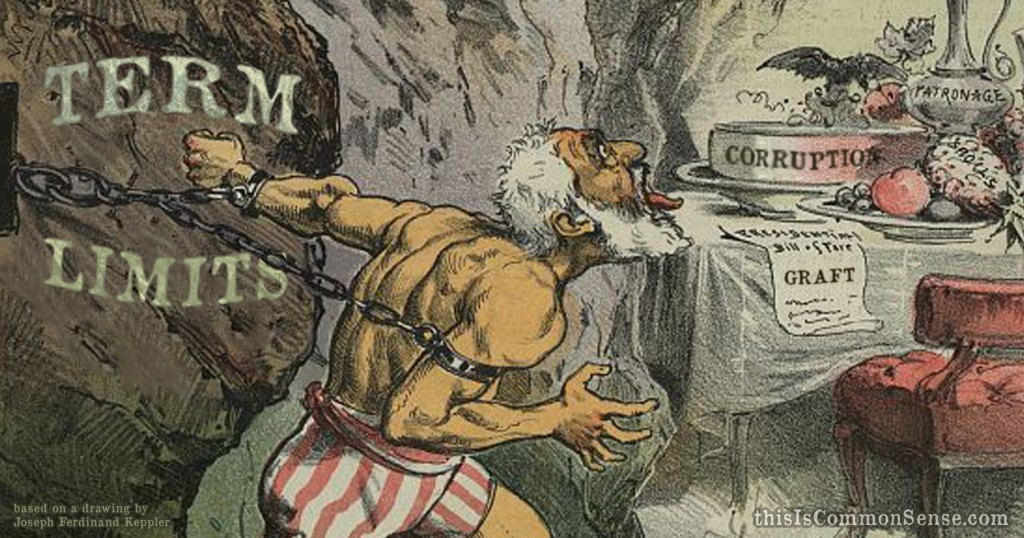Enough is enough! Our hard-earned tax dollars shouldn’t line the pockets of politicians living like royalty while we struggle to make ends meet. Let’s demand fair reforms: cut their salaries, strip away their lavish perks, and make them work for every penny they earn.
Tag: Term Limits
Empowering the People: The Congressional Term Limits and Compensation Reform Act
In a world of increasing political polarization and public frustration with the seemingly entrenched nature of American politics, it’s time to cut through the noise and make a change that puts the power back where it belongs: in the hands of the people. Imagine a Congress where our elected officials don’t make a career out of politics, but instead, they bring fresh ideas, energy, and dedication to the table. Picture a system where those who serve do so out of a genuine commitment to public service, rather than the allure of a hefty salary. In this guide, we’ll explore the Congressional Term Limits and Compensation Reform Act, a groundbreaking proposal designed to reshape the landscape of American governance.
This isn’t just about term limits; it’s about resetting the balance of power and reviving the spirit of public service. Whether you’re a staunch advocate for change or someone looking for a way to break free from the status quo, this bill could hold the keys to reshaping the future of American politics. So, let’s dive in, explore the details, and see how the Congressional Term Limits and Compensation Reform Act could be the catalyst for a more dynamic, responsive, and accountable government.
Congressional Term Limits and Compensation Reform Act of 2023
Sponsored by Gags (Common Sense Evaluation)
SECTION 1: TERM LIMITS
(a) In order to promote fresh ideas, diversity of representation, and reduce the potential for career politicians. No person shall serve as a Member of the United States House of Representatives or the United States Senate for more than two terms.
(b) For the purposes of this section, a term shall be defined as serving a full term in the United States House of Representatives or the United States Senate. If a person has previously served as a Member of Congress, their prior terms of service shall be counted toward the two-term limit, regardless of the period in which they were served.
(c) No person shall be eligible for re-election as a Member of Congress if they have already served two terms. This limitation applies retroactively to all current Members of Congress.
SECTION 2: COMPENSATION REFORM
(a) Effective immediately upon the passage of this Act, Members of the United States House of Representatives and the United States Senate shall receive no salary or compensation for their service.
(b) Any benefits, allowances, or reimbursements related to their official duties and expenses incurred during their service shall be provided only for expenses incurred within the United States.
(c) Any overseas travel or related expenses incurred during official duties shall be the sole responsibility of the Member of Congress, and no public funds shall be used to cover such expenses.
SECTION 3: IMPLEMENTATION
(a) The provisions of this Act shall take effect starting with the next election cycle for Members of Congress.
(b) All terms served prior to the enactment of this Act shall not count towards the term limit imposed by Section 1.
(c) The Secretary of State and the Chief Administrative Officer of the United States House of Representatives, in consultation with the Senate Sergeant at Arms, shall be responsible for implementing and overseeing the compensation and reimbursement policies as described in Section 2.
SECTION 4: ENFORCEMENT
(a) Violations of the term limits set forth in this Act shall be subject to penalties, including disqualification from running for re-election, as determined by the relevant federal election authorities.
(b) Violations of the compensation and reimbursement policies set forth in this Act shall be subject to investigation and possible legal action, including reimbursement of funds improperly received.
SECTION 5: DEFINITIONS
(a) “Member of Congress” refers to individuals serving in the United States House of Representatives or the United States Senate.
(b) “Terms” refer to full terms of service in either the United States House of Representatives or the United States Senate.
SECTION 6: SEVERABILITY
(a) If any provision of this Act, or the application of such provision to any person or circumstances, is held invalid, the remainder of the Act, or the application of the provisions to other persons or circumstances, shall not be affected.
SECTION 7: EFFECTIVE DATE
This Act shall take effect immediately upon its passage into law.
Stewards of the Republic
The framers of the constitution envisioned the common folk, the electors from all walks of life, to take the mantle of leadership as Senators and Representatives in all levels of government from time to time. They were to serve the people, do the important work of the government as stewards of the Republic and then, after a short stint, return to the pool of electors and let someone else take the reins of public service. They did not envision “Political Science” degree holders, attorneys, etc., holding full-time positions in power. This is where the problem lies. When the elected become entrenched, they tend to forget they are there to serve the Republic, the electors, and not the other way around. Familiarity breeds contempt. Contempt for those they serve.
The Case for Term Limits: Enhancing Our Republic and Renewing Public Service
As debates surrounding the effectiveness and longevity of elected officials continue, the concept of term limits has emerged as a prominent topic of discussion. Term limits refer to the legal restrictions placed on the number of times an individual can hold a particular elected office. Term limits are designed to bring about fresh perspectives, promote accountability, and prevent the consolidation of power. In this article, we delve into the case for term limits and explore how they can strengthen our Republic and encourage the renewal of leadership.
Renewed Constitutional Republic
Term limits promote a vibrant and inclusive Republic by ensuring a constant flow of new voices and ideas into positions of power. By limiting the number of terms an individual can serve, term limits prevent the entrenchment of incumbents and open up opportunities for fresh talent and innovative approaches. This infusion of new blood encourages a more diverse representation of interests and perspectives, better reflecting the developing needs and desires of the people.
Accountability and Reduced Corruption
One of the primary benefits of term limits is the enhanced accountability they foster. With limited time in office, elected officials are constantly aware of their limited mandate and the need to deliver tangible results within a fixed timeframe. Term limits create a sense of urgency and discourage complacency, as politicians understand that their time in power is finite and tied directly to their performance. This accountability leads to greater responsiveness to public concerns, as elected officials must actively work to address pressing issues to ensure their re-election or pave the way for new leaders.
Moreover, term limits can help curb corruption and the abuse of power. Over time, incumbents may accumulate undue influence, foster cronyism, or become disconnected from the concerns of their constituents. By enforcing term limits, the likelihood of succumbing to corruption diminishes, as there is less time and opportunity to cultivate networks of vested interests or engage in unethical practices.
Career Politicians
Term limits break the cycle of career politicians. When individuals are limited in the number of terms they can serve, they are encouraged to explore other avenues of public service, gain diverse experiences, or contribute to society in different capacities. This system fosters a more dynamic and merit-based political landscape, attracting candidates with expertise from various fields and ensuring a constant influx of fresh ideas and perspectives.
Mitigating Political Stagnation
Longevity in office can sometimes lead to political stagnation. Without term limits, politicians may grow complacent, losing touch with the evolving needs of their constituents. They may become resistant to change, favoring the status quo over innovation and reform. Term limits break this cycle and offer the opportunity for regular turnover in leadership, bringing new energy, ideas, and approaches to governance. This constant influx of new leaders fosters an environment conducive to progress, adaptability, and continuous improvement.
Preserving Checks and Balances
Term limits also play a crucial role in preserving the system of checks and balances. By preventing the consolidation of power within a few long-serving individuals, term limits ensure a healthy distribution of authority. This distribution helps prevent the dominance of any one branch or level of government and maintains the delicate balance required for effective governance. The constant rotation of leaders provides a natural check on the concentration of power and promotes a more balanced and accountable political system.
Final Thoughts
Term limits are an essential mechanism for maintaining a vibrant Republic, promoting accountability, and encouraging the renewal of leadership. By limiting the number of terms an individual can serve, term limits ensure a dynamic and diverse political landscape, while reducing corruption and preserving checks and balances. As societies evolve, it is imperative to explore ways to revitalize our Constitutional Republic and ensure that the voices of the people are heard. Term limits serve as a powerful tool in achieving these goals, fostering a more responsive, accountable, and forward-thinking political environment.




